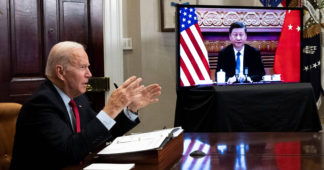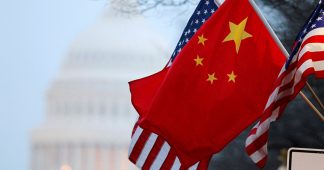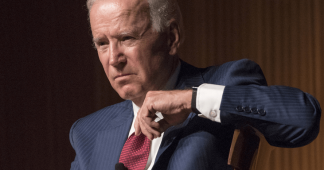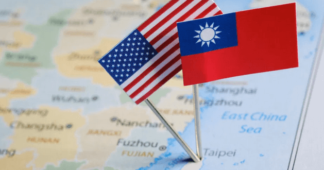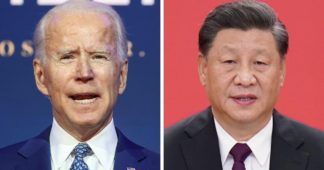Nov 16, 2021
The virtual meeting between Chinese President Xi Jinping and US President Joe Biden was held on Tuesday morning Beijing time. The readouts released by the two sides are both relatively positive. The world has seen how Chinese and US leaders frankly discuss strategic, overall and fundamental issues between China and the US, as well as issues of mutual concern. The wordings in their readouts have catered to the feelings of the other side. The readout of the US side did not use tough words as it had used before the meeting. The meeting will play an active role in leading international opinion for their positive expectations toward China-US relations.
Objectively speaking, China-US relations have come to a point where they must strengthen and manage divergences and ease the tense atmosphere. Since the previous US administration, Washington’s China policy has been keeping steering away from the rational track, with the Cold War-like confrontational mentality prevailing. The US ratcheted up maneuvers, including advocating high-tech decoupling, economic sanctions and strengthening ties with allies to confront China. These moves seriously jeopardized the previous atmosphere between China and the US. They also reinforced people’s worries about strategic confrontation and conflicts between China and the US.
It is hoped the virtual summit between the Chinese and US heads of state will play a role to lead China-US ties toward strategic correction, and pull relations back to the track of conforming to the fundamental interests of both countries. This will also benefit the world’s long-term peace and stability.
The root cause of the deterioration of China-US relations in recent years lies in Washington. It stems from arrogant and aggressive changes in the US policy toward China. Yet the US has not gained actual benefits from its moves to jeopardize relations with China, especially in economic terms. The containment against China has not reaped any effect, but is in fact facing more and greater risks. At least, to some extent, a demand for stabilizing China-US relations has emerged in the US. So the latter has recently repeatedly emphasized the need to prevent China-US competition from turning into conflict and it claims that Washington does not seek to change the Chinese system.
This meeting confirmed the common desire of China and the US to ease their differences and manage their relationship. It also showed a positive attitude toward cooperation from the two sides. On the most sensitive Taiwan question, the two countries reiterated their respective positions. The US stated its standard American “one-China policy,” but Biden articulated that the US does not support “Taiwan independence.” It is hoped that this will play a positive role to suppress the collusion between the US and Taiwan to continuously undermine the political foundation for cross-Straits peace and stability and lead to escalating military tensions.
Chinese and US heads of state held a serious video summit amid bilateral tensions, focusing on the most concerning issues for the two countries and the world. It was a strategic declaration that China and the US will spare no efforts to coexist peacefully, and they will not go back to a cold war era.
It is most important for both countries to implement the consensus spirit of this summit and respond with constructive moves in various spheres. There is worry that though the two leaders had a good talk, but the momentum cannot be relayed to key areas of the bilateral ties. After a brief period, the positive atmosphere will be exhausted by new and existing frictions.
We have had some sharp lessons, and the US is generally the side to blame. For example, the US often released confrontational messages soon after important phone calls or meetings between Chinese and US heads of state are held. Besides, in the fragmented power system in the US, there are other countervailing forces quickly stepping up to block the implementation of the consensus between the leaders in specific areas. The US administration had to balance those domestic objections with some tough words that undercut prior summit’s outcomes.
The Biden administration needs to remember clearly their original intention of proposing this China-US virtual summit and make consistent moves to ease bilateral tensions, and also avoid petty calculations. With this virtual meeting serving as a watershed moment, we can posit that: if the next stage of China-US relations can have more stability and predictability, and less turbulence, and if they can have broader cooperation, as well as handle differences more properly, the Biden administration will deserve more strategic trust and respect.
China-US relations have huge economic and social exchanges. This is completely different from US-USSR relations in the past. China and the US now stand at a crucial crossroads: are they heading toward a new cold war or beginning a new era of a major power relationship? Through this video summit, the two heads of state declared that they reject a new cold war. We hope this is a strategic declaration, and whoever violate it is a sinner.
Published at www.globaltimes.cn
We remind our readers that publication of articles on our site does not mean that we agree with what is written. Our policy is to publish anything which we consider of interest, so as to assist our readers in forming their opinions. Sometimes we even publish articles with which we totally disagree, since we believe it is important for our readers to be informed on as wide a spectrum of views as possible.
